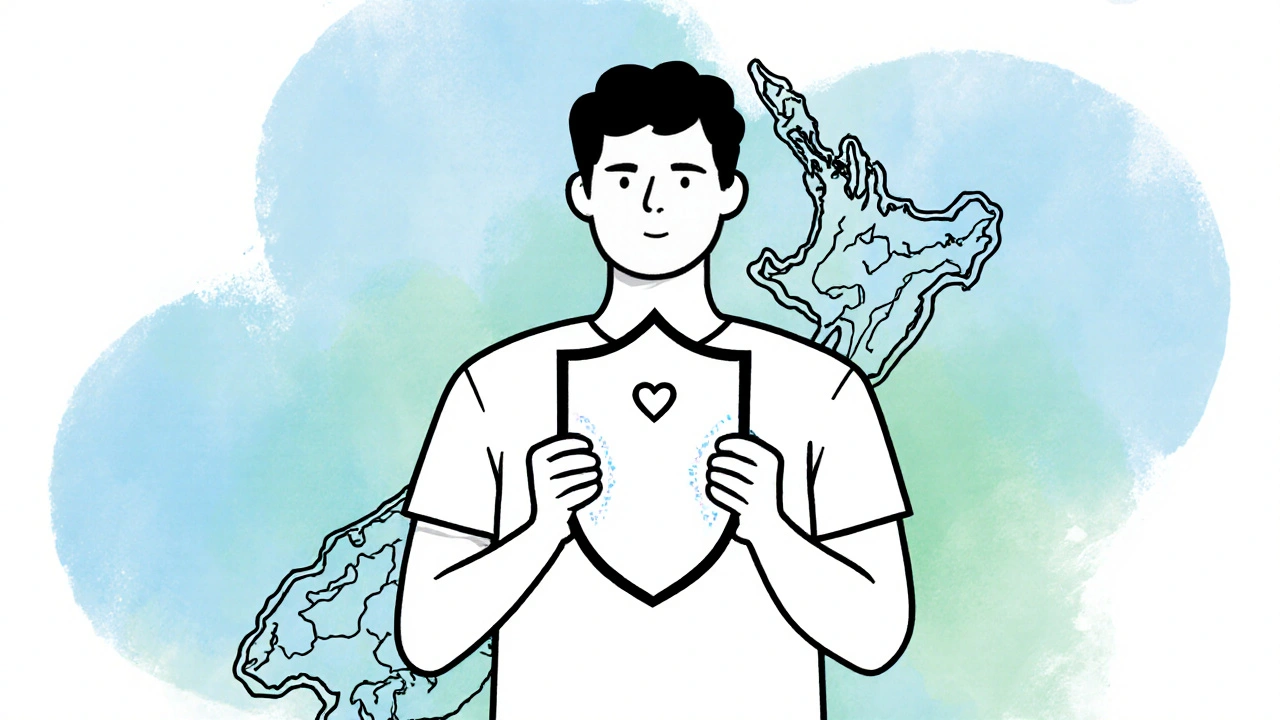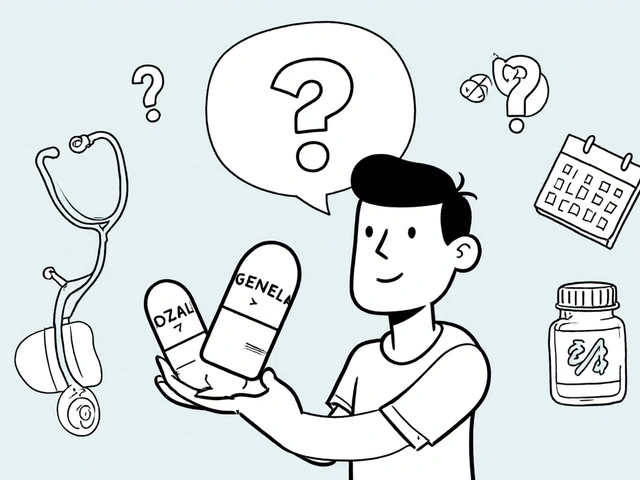
HIV Discrimination Rights Checker
Select the area where you're experiencing potential discrimination or need guidance.
Important: This tool provides general guidance only. For specific legal advice, consult a community legal centre or the HIV Advocacy Network.
Next Steps
- Human Rights Commission: Call 0800 200 200 or visit www.hrc.govt.nz
- HIV Advocacy Network: Contact them at www.han.org.nz for free legal referrals
- Community Legal Centres: Find your nearest centre at www.clc.org.nz
When you’re living with HIV is a virus that attacks the immune system, you quickly realize that medical care is only half the battle. The other half involves knowing HIV legal rights and how the law protects you from discrimination. In New Zealand, a mix of human‑rights legislation, privacy rules, and health‑specific statutes create a safety net, but you have to know where to look. This guide walks you through the key statutes, everyday pitfalls, and practical steps to keep your rights intact.
Quick Takeaways
- New Zealand’s Human Rights Act and Privacy Act explicitly forbid HIV‑related discrimination in employment, housing, and services.
- You have the right to keep your HIV status confidential unless you give informed consent.
- If you face discrimination, the Human Rights Commission can investigate and order remedies.
- Employers must provide a safe work environment but cannot demand medical tests unless strictly necessary.
- Legal help is available through community legal centres, the HIV Advocacy Network, and the Ministry of Health.
Understanding the Legal Landscape
New Zealand’s legal framework for HIV protection rests on three pillars:
- Human Rights Act (1993) prohibits discrimination on the basis of disability, which the Act interprets to include HIV status.The Act covers employment, housing, education, and the provision of goods and services.
- Privacy Act (2020) sets strict rules on how personal health information can be collected, used, and disclosed.Health providers must obtain explicit consent before sharing HIV test results.
- The Public Health Act (2010) gives the Ministry of Health authority to manage communicable diseases while balancing individual rights.It allows for contact tracing but does not permit forced disclosure of status without a court order.
These statutes interact with sector‑specific rules, such as the Employment Relations Act for workplace issues and the Residential Tenancies Act for housing.
Core Rights for People Living with HIV
Here’s what the law guarantees you, day‑to‑day:
- Confidentiality: Your HIV status is personal health information. Health providers, insurers, and employers must keep it private unless you sign a release.
- Equal Treatment: You cannot be dismissed, denied a promotion, or refused a rental simply because you are HIV‑positive.
- Safe Work Environment: Employers must protect you from exposure to blood‑borne pathogens but cannot force you to undergo regular HIV testing.
- Access to Services: Public hospitals, sexual health clinics, and community health services must provide care without discrimination.
- Right to Redress: If discrimination occurs, you can lodge a complaint with the Human Rights Commission, which can order compensation, reinstatement, or policy changes.
Common Legal Challenges
Even with robust laws, people encounter real‑world obstacles. Below are the most frequent issues and why they happen.
| Issue | What the Law Says | Practical Tip |
|---|---|---|
| Employer asks for HIV test during routine health checks | Allowed only if the role involves high‑risk exposure (e.g., healthcare, emergency services) | Request written justification; if none, refuse and cite the Human Rights Act |
| Landlord refuses to rent after learning of HIV status | Discrimination under the Human Rights Act is illegal | Document the refusal and contact the Human Rights Commission within 90 days |
| Health provider shares test results with a third party without consent | Violation of the Privacy Act - can lead to penalties and civil claims | Ask for a written apology and request the breach be reported to the Office of the Privacy Commissioner |
| Criminal charges for exposing a partner without disclosure | Only prosecute if there was intent to infect and the act was reckless; consent matters | Seek legal advice immediately; many cases are dismissed if no intent is proven |
How to Protect Your Rights
Knowledge is your first line of defence. Follow these habits to stay safe legally.
- Keep Records: Save emails, letters, and notes from any interaction where your status was discussed. A simple spreadsheet can track dates, parties involved, and outcomes.
- Ask for Written Consent Forms: Whenever a health provider or employer needs your HIV information, request a clear consent form that explains why the data is needed and how it will be stored.
- Know the Complaint Timelines: The Human Rights Commission requires complaints within 90 days of the alleged discrimination. Missing the window can bar you from relief.
- Use Support Services: Organizations like the HIV Advocacy Network (HANZ) offer free legal advice, peer support, and can represent you in tribunals.
- Stay Informed of Policy Changes: Legislation evolves. Subscribe to updates from the Ministry of Health and the Human Rights Commission.
Navigating the System: Practical Steps
When you think your rights have been breached, here’s a step‑by‑step road map.
- Assess the Situation: Identify who acted, what they did, and how it affected you. Write a brief summary.
- Seek Immediate Advice: Contact a community legal centre (e.g., Auckland Community Law Centre) or HANZ for a free initial consultation.
- File a Formal Complaint: For employment or housing issues, submit a written complaint to the Human Rights Commission. Include all supporting documents.
- Consider Mediation: The Commission often offers mediation before proceeding to a tribunal. It’s quicker and less stressful.
- Proceed to the Human Rights Review Tribunal: If mediation fails, the tribunal can order compensation, reinstatement, or policy changes. Your legal adviser can help prepare your case.
- Address Privacy Breaches: Report violations to the Office of the Privacy Commissioner. They can investigate and enforce penalties.
- Stay Proactive: After a resolution, request written confirmation that the offending party will not repeat the behavior. Keep this on file.
Resources & Support
Below is a quick list of agencies and tools you can turn to right now.
- Human Rights Commission: 0800 200 200 (phone), online complaint portal.
- Office of the Privacy Commissioner: www.privacy.org.nz - includes a guide on health information.
- HIV Advocacy Network (New Zealand): Offers peer counselling, legal referrals, and educational workshops.
- Auckland District Health Board - Sexual Health Services: Free testing and counselling, confidentiality guaranteed.
- Community Legal Centres: Provide free or low‑cost legal advice for discrimination cases.
Frequently Asked Questions
Can an employer force me to take an HIV test?
Only if the job involves a genuine risk of blood exposure, such as a surgeon or lab technician. For most roles, a test would breach the Human Rights Act.
What should I do if my doctor shares my HIV status with my partner without my consent?
File a complaint with the Office of the Privacy Commissioner. You can also request an apology and consider legal action for breach of privacy.
Is it illegal to refuse a rental property because of my HIV status?
Yes. The Human Rights Act makes such discrimination unlawful. Report the incident to the Human Rights Commission within 90 days.
Can I be sued for not disclosing my HIV status to a sexual partner?
Criminal liability only arises if you knowingly and intentionally exposed someone to HIV without consent. Even then, consent, viral load, and intent are heavily scrutinized. Seek legal advice immediately.
Where can I get free legal help for discrimination?
Community legal centres, the HIV Advocacy Network, and the Human Rights Commission’s advice service all provide free guidance for people living with HIV.
Understanding your rights isn’t a one‑time task; it’s an ongoing conversation with the law, your workplace, and the health system. Keep this guide handy, stay connected with support groups, and remember that the legal framework is there to protect you.




12 Comments
Living with HIV can feel like navigating a maze where every turn is guarded by legal statutes; understanding those statutes is as vital as taking medication. The Human Rights Act, the Privacy Act, and the Public Health Act together form a triad that shields you from discrimination. Yet, the strength of that shield depends on how well you wield the knowledge of your rights. Keeping records of any interaction where your status is discussed is not just bureaucratic diligence-it’s an act of self‑preservation. Likewise, demanding written consent before any disclosure ensures that privacy isn’t a vague promise but a documented agreement. When employers invoke 'routine health checks,' you have the right to request a clear, written justification rooted in the law. In the housing market, a landlord’s sudden change of heart after learning about HIV status is a red flag demanding immediate action. It is essential to remember that the Human Rights Commission acts as a sentinel, ready to investigate and remedy breaches within a strict ninety‑day window. By viewing legal empowerment as a daily practice rather than a one‑off event, you turn the abstract language of statutes into a concrete safety net. Ultimately, knowledge combined with vigilance creates a resilient front against discrimination.
This guide is a total waste of time.
They want you to think the law protects you but the system is rigged and every clause can be twisted to trap you
Morally speaking, anyone who would deny a person housing or employment because of a medical condition is violating the fundamental principles of dignity and equality. The law exists precisely to curb such unscrupulous behavior, and we must hold society accountable to those standards. Ignoring these rights not only hurts the individual but erodes the moral fabric of our community.
Honestly, the legal stuff sounds intimidating, but most workplaces just need a reminder that privacy rules aren’t optional. If you get a weird request for an HIV test, ask them to put it in writing and see if it actually meets the 'high‑risk' criteria – most won’t. It’s a good way to call out unnecessary drama without making a huge scene.
Sometimes i’ve seen people in my clinic freak out when a manager mentions testing, and they end up withdrawing from work altogether because they feel insecure. It’s like the fear itself becomes a barrier, even though the law says otherwise.
OMG, the anxiety is REAL! 😱 When someone drops a 'we need your results' bomb, it’s like the whole world stops spinning and all you can hear is that creepy heartbeat. 😩 It’s heartbreaking to watch folks shrink back into silence because they’re terrified of being judged. 🌈💔 Let’s keep shouting that privacy is non‑negotiable and that we deserve respect!
Keep the information handy and share it with trusted friends – knowledge is power.
Being aware of your legal rights makes it easier to stand up for yourself when a landlord or employer tries to cross the line.
Let me tell you why this guide, while useful, still falls short of the battle many of us are fighting on a daily basis. First, the language of the statutes is dense and impenetrable to anyone without a law degree, which creates a barrier that the guide doesn’t fully dismantle. Second, the emotional toll of constantly fearing discrimination is glossed over, as if a checklist can replace genuine support. Third, many of the resources listed have limited hours and long waiting lists, meaning that help isn’t always immediate when you need it most. Fourth, the guide assumes you have the time and energy to keep meticulous records, but a lot of people are already overwhelmed with medical appointments and medication regimes. Fifth, there’s little discussion about the intersectionality of HIV status with other identities such as race, gender, or socioeconomic status, which can compound discrimination in ways the guide barely scratches. Sixth, the 'quick takeaways' format makes it seem like a simple cheat sheet, yet navigating the Human Rights Commission process can feel like wading through a bureaucratic swamp. Seventh, the advice to 'seek mediation' sounds reasonable until you realize that mediation often favors the employer, leaving the victim with a fraction of the desired outcome. Eighth, the guide mentions the Privacy Act but fails to explain the practical steps to file a complaint with the Privacy Commissioner effectively. Ninth, the legal thresholds for 'high‑risk' exposure in workplaces are vague, and many employers exploit that ambiguity to demand unnecessary testing. Tenth, the guide’s tone is almost too calm, not reflecting the anger and frustration many of us feel when our rights are ignored. Eleventh, the absence of personal stories or testimonials makes the guide feel detached and impersonal. Twelfth, the resource list, while comprehensive, doesn’t prioritize which services have the best success rates for resolving cases. Thirteenth, there’s no guidance on how to handle social stigma within families or communities, which can be just as damaging as institutional discrimination. Fourteenth, the guide could benefit from more visual aids or flowcharts to simplify the step‑by‑step process. Fifteenth, it would help to have a ready‑to‑use template for complaints, so people don’t have to start from scratch. And finally, the most important point is that you must keep fighting, because the legal system alone won’t change hearts and minds, but armed with knowledge and community support, you can push back against the prejudice that still lurks in the shadows.
Wow, that was an epic rundown! 🌟 You’ve nailed a lot of the gaps that many of us feel but rarely voice. It’s reassuring to see someone call out the bureaucracy while also reminding us we’re not alone in this fight. I’m glad you highlighted the need for templates and visual aids – those can really streamline the process. Let’s keep sharing resources and supporting each other so the system feels a little less like a swamp.
Hey team, i totally agree with the points you all raised – especially about needin’ those easy‑to‑fill templates and step‑by‑step guides. Sometimes i feel like the legal jargon is like a mountain that we have to climb without a map, and having a friendly hand to point out the trail markers makes all the difference. Remember, staying positive and keepiing each other motivated is key; we can turn this legal maze into a path we all walk together! Let’s keep pushing for better resources, share our stories, and never forget that we have the right to be treated fairly. Together we’re stronger, and i’m excited to see what we can achieve.